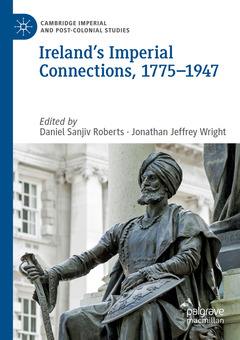Description
Ireland's Imperial Connections, 1775-1947, 1st ed. 2019
Cambridge Imperial and Post-Colonial Studies Series
Language: English
Subjects for Ireland's Imperial Connections, 1775-1947:
Publication date: 11-2020
Support: Print on demand
Publication date: 11-2019
Support: Print on demand
Description
/li>Contents
/li>Biography
/li>Comment
/li>
This edited collection explores the complexities of Irish involvement in empire. Despite complaining regularly of treatment as a colony by England, Ireland nevertheless played a significant part in Britain?s imperialism, from its formative period in the late eighteenth century through to the decolonizing years of the early twentieth century. Framed by two key events of world history, the American Revolution and Indian Independence, this book examines Irish involvement in empire in several interlinked sections: through issues of migration and inhabitation; through literary and historical representations of empire; through Irish support for imperialism and involvement with resistance movements abroad; and through Irish participation in the extensive and intricate networks of empire. Informed by recent historiographical and theoretical perspectives, and including several detailed archival investigations, this volume offers an interdisciplinary and evolving view of a burgeoning field of research and will be of interest to scholars of Irish studies, imperial and postcolonial studies, history and literature.
1. Introduction - Daniel Sanjiv Roberts and Jonathan Jeffrey Wright.
I Inhabiting Empire.
2. “Residing in this Distant Portion of the Great Empire”: The Irish in Imperial Halifax, Nova Scotia – Peter Ludlow and Terrence Murphy.
3. From Enniskillen to Nairobi: The Coles in British East Africa – Eve Patten.
4. Walking to China: Infatuation and the Irish in New South Wales – Killian Quigley.
5. Competing Narratives: ‘White Slavery’, Servitude and the Irish in Late Eighteenth-Century America – Martyn Powell.
II Writing/ Imagining Empire.
6. “Humble Obedience to the Will of Heaven”: Charles Johnston’s Providential and Migratory Sensibility – Daniel Sanjiv Roberts.
7. Prudence and Prejudice in Maria Edgeworth’s “Murad the Unlucky” (1804) – Sonja Lawrenson.
8. “Purely a Local Study”?: Narratives of Empire in George Benn’s History of the Town of Belfast – Jonathan Jeffrey Wright.
III Resistance/Collusion.
9. The 1857 Indian Uprising in Irish Ballads: Voices of the Subaltern – Sarah Raphaela Adjobimey.
10. Afghanistan, the Indian “Mutiny,” and the Bicultural Stereotype of John Nicholson– Pramod K. Nayar.
11. Violent Resistance: The Irish Revolution and India – Kate O’Malley.
IV Networking.
12. Stateless and Destitute: The O’Rourke Family of Saint-Domingue, Nantes and Wexford, 1788-1805 – Orla Power.
13. An Irish Surgeon in Barbados and Demerara: Vexation, Misery and Opportunity – Jennifer McLaren.
14. “Colouring the map red”: Lady Hariot Dufferin and the Imperial Networks of the Dufferin Fund – Sarah Hunter.
Daniel Sanjiv Roberts is a Reader in English at Queen’s University Belfast, UK. He has published major scholarly editions of writers such as Charles Johnston, Robert Southey and Thomas De Quincey and written widely on eighteenth-century literature, and on Indian and Irish literatures in English. His edition of Southey's The Curse of Kehama was cited as a Distinguished Scholarly Edition by the M.L.A. in 2005.
Jonathan Jeffrey Wright is a Lecturer in History at Maynooth University, Ireland. His publications include The ‘Natural Leaders’ and their World: Politics, Culture and Society in Belfast, c. 1801-1832 (2012), Spaces of Global Knowledge: Exhibition, Encounter and Exchange in an Age of Empire (2015, edited with Diarmid A. Finnegan) and Urban Spaces in Nineteenth-Century Ireland (2018, edited with Georgina Laragy and Olwen Purdue).
Takes a truly interdisciplinary approach, bringing together recent scholarship from historical and literary studies
Covers a broad chronological and geographical range, allowing for developments and continuities to be traced across several centuries and borders
Contributes to ongoing debates relating to Ireland and empire, postcolonial studies and Irish studies across its four parts: inhabiting, writing, resisting and networking empire




